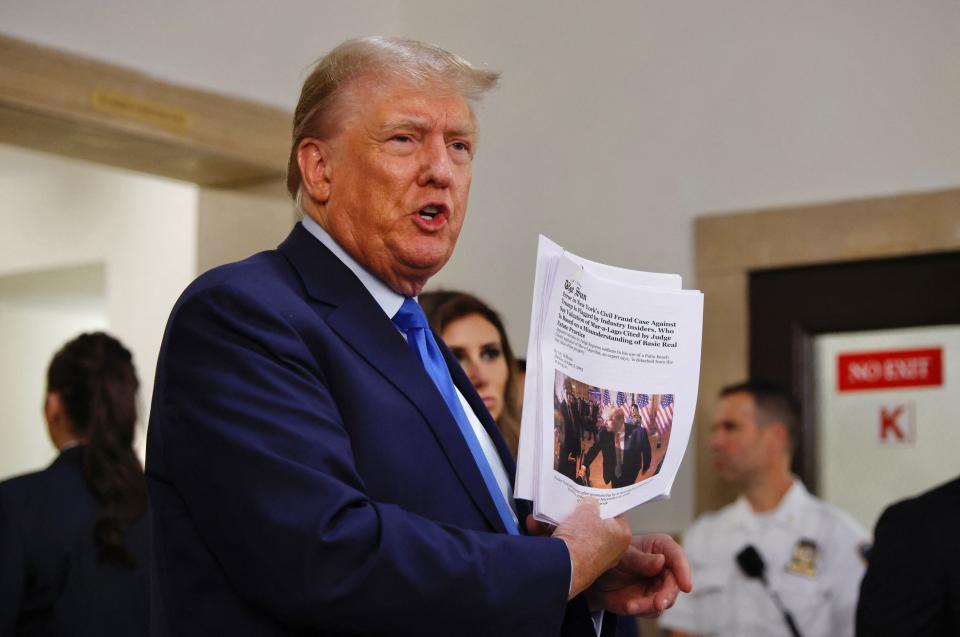Trump loses early-win bid at NY fraud trial after wild arguments invoking spaghetti, Vladimir Putin, and geese
- Oops!Something went wrong.Please try again later.
- Oops!Something went wrong.Please try again later.
- Oops!Something went wrong.Please try again later.
A judge on Thursday rejected Trump's bid for an early win in his civil fraud trial in New York.
The decision was preceded by often colorful arguments invoking Putin, geese, and "spaghetti night."
The defense will now begin an expected 6-week case, fighting NY's efforts to penalize Trump more than $250M.
Donald Trump lost his bid for an early win in his New York fraud trial Thursday, after three hours of sometimes colorful legal arguments — in which lawyers and the judge invoked the president of Russia, geese of either gender, and "spaghetti night."
"Vladimir Putin has some openings," Trump lawyer Christopher Kise sniped at a lawyer for New York at one point mid-morning, in complaining about a state effort to bar defense expert witnesses from testifying.
"I think it's totally uncalled for. Totally incorrect," the judge quickly told Kise of his Putin crack. Kise immediately promised to "refrain from further pejoratives," and later apologized.
The judge presiding over the non-jury trial, state Supreme Court Justice Arthur Engoron, did not issue a formal ruling on Trump's request to stop the trial and declare the former president the winner.
Instead, the judge repeated what he's said in earlier rulings — that there is already plentiful proof of fraud — and he told both sides to prepare to resume trial next week.
The trial is now scheduled to continue into mid-December, with a 100-witness-long parade of Trump witnesses queuing up to testify, starting Monday with a reprise appearance by Donald Trump, Jr.
To use a "Groundhog's Day" analogy — apt given the often repetitive testimony and arguments so far — the judge on Thursday emerged from his chambers after the lunch break and appeared to declare around six more weeks of trial.
A wild and crazy hearing
No actual Trumps were present in the Manhattan courtroom to hear the bad news. Instead, there were two tables full of lawyers, both for the defense and for state Attorney General Letitia James.
James alleges the former president, his two sons, and his New York-headquartered golf-resort and real-estate empire, the Trump Organization, routinely lied in a decade's worth of banking documents. The lies helped Trump win more than $250 million in ill-gotten profits and loan interest-rate discounts, the AG alleges.
"This is a documents case," one of James' lead lawyers, Kevin C. Wallace, said during the free-wheeling arguments that preceded the judge telling everyone to keep going.
Those documents are Trump's annual, 30-page assertions of net worth, the so-called "statements of financial condition" that are central to the trial.
The former president used these net-worth estimates to secure and maintain the more than $400 million in development loans behind his Chicago skyscraper, his Miami golf course, and the Trump International Hotel in the historic Old Post Office building in Washington, D.C.
Trump's self-reported worth in these statements of financial condition exceeded his actual worth by as much as $3.6 billion a year, the AG has alleged. The three Trumps' signatures are on multiple documents affirming that the estimates are accurate.

Enough evidence to fill the overflow courtroom
Wallace argued that these net-worth statements and other supporting documents, along with the testimony from the past five weeks, offer ample proof of fraud. In describing how ample, Wallace harkened back to an exaggeration the judge used October 25, in swatting down a previous defense request for an early verdict in their favor.
"There's enough evidence to fill this courtroom," the judge said then. Wallace took the analogy still further Thursday.
At this point, he said, referring to a courtroom one floor down, where the proceedings are broadcast on screens, "there's enough evidence to fill the overflow courtroom."
Kise, meanwhile, argued that having a lot of evidence isn't the same as having a lot of good evidence.
Spaghetti night at Manhattan Supreme Court
"It's what we call 'spaghetti night,'" Kise quipped of the attorney general's fact-dense case, which alleges frauds involving a dozen Trump properties and a half-dozen loans and insurance deals going back a dozen years.
"Just throw it against the wall and see what sticks," Kise complained.
"You just have to be careful talking about spaghetti at lunchtime," the judge quipped back.
A wild goose chase
Another, far more extended, food analogy fluttered into Thursday's pre-lunch arguments in the form of geese, along with their associated condiments.
This was a call-back to the judge having once joked, back in October, that "what's sauce for the goose is sauce for the gander."
The judge had made the remark when Kise complained about Michael Cohen's anti-Trump tweets. Kise reprised it Thursday in arguing that the AG was being unfair in seeking to bar testimony by defense expert witnesses.
"The goose-gander rule applies here, fully," Kise complained of the AG's side.
"There is no reason to shut the door " on our experts, Kise argued, "after they have benefitted handsomely from it being open."
The Trump lawyer noted that none of the state's witnesses, including their experts, were ever barred from testifying.
Andrew Amer, an assistant attorney general, joined in promoting the judge's geese-gander adage to "rule" status, though he disagreed with Kise.
"There's no goose-gander rule that says if I sustain ten of one side's objections, I have to sustain ten of the other side's objections," Amer said.
After lunch, the judge ruled in the Trump team's favor, saying he would allow their experts to testify, but with a caveat.
"The bottom line is that I'll let all of the defense's proposed experts testify," he said. "But if it's not relevant, I'm not going to allow it."
Read the original article on Business Insider

